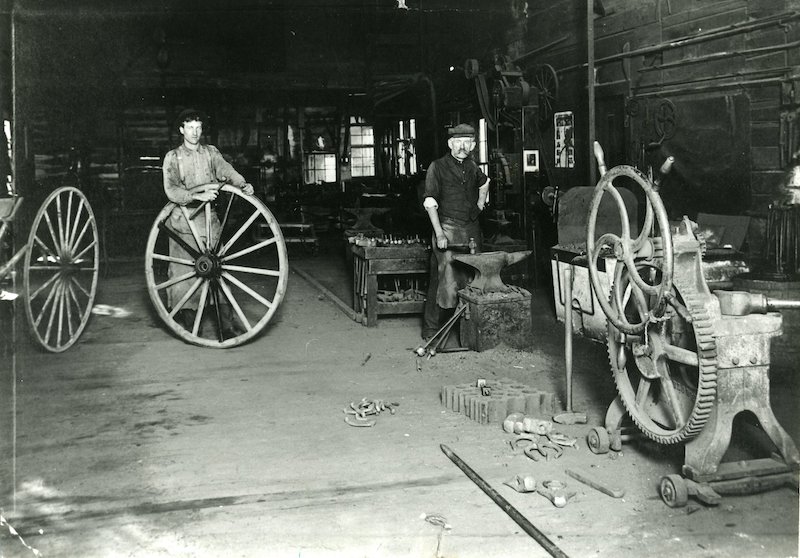November 27, 1964 – The old blacksmith shop on the northwest corner of Lansing and Little Lake streets (where Century 21 is located today) was demolished. According to the Beacon, the big building “went down with a crash when Clarence Ponts made his final attack on it with his big cat.”
The building had its beginnings in November 1882, when blacksmith and wheelwright George Hall built a 24×40 foot shop for his business at this location. In addition to blacksmithing, he also provided essential services to the community like carriage repair, made-to-order buggies, and horseshoeing.

Interior of the Seman Blacksmith Shop, c. 1905. Owner, Emil Seman, Sr. stands on the right at the anvil, hammer in hand, ready to shape a horseshoe, wheel, or plowshare, while at the wheel on the left side of the photo is his son, Emil Seman, Jr.
By the end of the following year, Hall had converted the original space into a store selling groceries, boots and shoes, cigars and tobacco, and canned fruit, candy and apples. Hall proudly advertised his grocery store as “cheaper than the cheapest.”
Blacksmithing remained an essential service, and Hall expanded the building to accommodate his diverse offerings. A horse barn on the west end of the store and a new shop on the north side allowed him to continue his blacksmithing and wagon business while expanding into woodworking.
In 1888, the building was renovated and turned into a saloon under the management of H. B. Seavey, owner of the Alhambra Hotel on Main Street, and businessman Moses Greenwood. Over the years, the barroom changed hands multiple times, passing through the ownership of G. Goranson, Mike Sullivan, Jack O’Donnel, Jack Baskerville (with “Duke” Herzog tending bar), and finally William Grotz.
In January 1897, Grotz moved his saloon business to Main Street, and blacksmith Emil Seman began restoring the building to its original purpose. Emil was already well known in Mendocino as a first-class wagon builder. In 1891, he had partnered with Jacob Stauer in the blacksmith shop located on the east side of Lansing Street (where the Mendocino Volunteer Fire Department’s fire station is today). Following Stauer’s death in a tragic accident in Arizona, Emil purchased the other half of the business from Stauer’s widow.
By October 1897, the renovated building was ready, and Emil moved his blacksmith business into the shop at Little Lake and Lansing. When his son Emil, Jr. left school, he joined his father in the blacksmith business. Besides blacksmithing and horseshoeing, they manufactured and sold tools and galvanized tank hoops. By 1907, they had incorporated a machine shop into the building, powered by a gasoline engine.
When Emil, Sr. passed away in 1926, the Beacon wrote, “Mr. Seman was an accomplished mechanic and a hard worker, and built up a profitable business by his industry and craftsmanship. His was one of the few [blacksmith] shops that did not go out of business when the auto superseded horses. Deceased was upright and honest in all his dealings; a good citizen who took a keen interest in his community’s welfare and all its activities.” Emil, Jr. continued the blacksmith business in the same shop until his retirement in 1950.
After years of disuse, the dilapidated blacksmith shop was razed. In 1972, Village Music opened in this location in “the sparkling new building with the red door.”
New Book! A Mendocino Remembrance, c. 1942. When Alvin Mendosa’s long-time friend Buddy Fraser passed away in 2018, Alvin received a copy of Buddy’s memoir of town life during World War II. Curated by former Kelley House director-curator Karen McGrath, this charming memoir brings to life the unique place that was the town of Mendocino, California before it became the artist colony and tourist destination for which it is well known today. During the 1940s, Mendocino was a quiet community of unpaved roads and Victorian-era architecture perched on bluffs above the Pacific Ocean. Fraser’s reminiscences are accompanied by vintage photographs from the Kelley House Museum archives paired with contemporary color images taken by photographer Jamie Armstrong, offering readers an enjoyable “Then and Now” view of Mendocino. $35